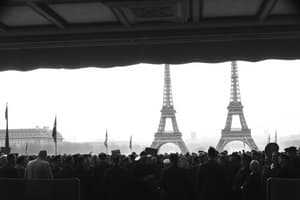Podcast
Questions and Answers
What were the triggers and causes of WW1?
What were the triggers and causes of WW1?
- Assassination of Archduke Francis Ferdinand of Austria (correct)
- Nationalism and alliance system (correct)
- Political instability in Germany
- Militarism (correct)
What were the triggers and causes of WW2?
What were the triggers and causes of WW2?
- The assassination of a leader
- The rise of Adolf Hitler (correct)
- Political and economic instability in Germany (correct)
- Treaty of Versailles conditions (correct)
What were the years of WW1?
What were the years of WW1?
1914-1918
What were the years of WW2?
What were the years of WW2?
Who were the conflicting parties in WW1?
Who were the conflicting parties in WW1?
Who were the conflicting parties in WW2?
Who were the conflicting parties in WW2?
What were the estimated casualties of WW1?
What were the estimated casualties of WW1?
What were the estimated casualties of WW2?
What were the estimated casualties of WW2?
What genocide occurred during WW1?
What genocide occurred during WW1?
What was a major difference between WW1 and WW2?
What was a major difference between WW1 and WW2?
What similar causes did WW1 and WW2 share?
What similar causes did WW1 and WW2 share?
Why was WW1 fought?
Why was WW1 fought?
Why was WW2 fought?
Why was WW2 fought?
Flashcards are hidden until you start studying
Study Notes
Triggers and Causes of WW1
- Assassination of Archduke Francis Ferdinand of Austria in June 1914 ignited the war.
- Contributing factors included militarism, imperialism, nationalism, and a complex alliance system.
Triggers and Causes of WW2
- Political and economic instability in Germany post-WWI led to the rise of Adolf Hitler.
- The Treaty of Versailles imposed harsh conditions, fostering resentment.
- Germany formed alliances with Italy and Japan to counter the Soviet Union.
Timeline of Conflicts
- World War 1 lasted from 1914 to 1918.
- World War 2 spanned from 1939 to 1945.
Conflicting Powers in WW1
- Central Powers included Germany, Austria-Hungary, and Turkey.
- Allied Powers comprised France, Britain, Russia, Italy, Japan, and later the U.S. (from 1917).
Conflicting Powers in WW2
- Axis Powers were Germany, Italy, and Japan.
- Allied Powers consisted of France, Britain, the U.S., the Soviet Union, and China.
Casualties of WW1
- Estimated military deaths reached 10 million.
- Civilian casualties totaled around 7 million.
- An additional 21 million were wounded, with 7.7 million missing or imprisoned.
Casualties of WW2
- World War II had over 60 million deaths, with estimates ranging from 50 to 80 million.
- Civilian deaths ranged between 38 to 55 million, including 13 to 20 million from war-related diseases and famine.
Genocide During WW1
- The Ottoman Empire perpetrated genocide against the Armenians during this conflict.
Key Differences Between WW1 and WW2
- The advancement of technology marked a significant contrast between the two wars.
- Trench warfare was prevalent in WW1; it decreased in WW2 due to shifting battlefields and tactics.
- Different weaponry and military strategies were employed in each war.
Similar Causes of Both Wars
- Nationalism, imperialism, alliances, and militarism were common triggers.
- German nationalism intensified after WWI's defeat, exacerbated by the Treaty of Versailles.
Reasons for Fighting WW1
- The war primarily aimed at acquiring colonies, territories, and resources among competing nations.
Reasons for Fighting WW2
- Ideological conflict characterized World War II, with fascism, communism, and Nazism as predominant ideologies.
Studying That Suits You
Use AI to generate personalized quizzes and flashcards to suit your learning preferences.




